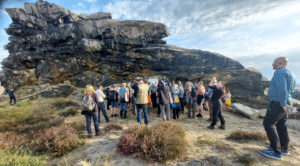Project 1612: SEQS-DATESTRA
An online meeting was organised on 13 December 2021, focused on “Quaternary Stratigraphy – palaeoenvironment and humans in Eurasia”.
Abstract
Following the success of the INQUA-SEQS 2020 Conference ‘Quaternary Stratigraphy – palaeoenvironment, sediments, fauna and human migrations across Central Europe’ which took place online on 28 September 2020, the Polish team decided to organise a successive in-person meeting in 2021 with plenary sessions held in the Śnieżnik Massif and field sessions in the Karkonosze Mountains, in caves of the Kłodzko Valley, and at palaeontological cave sites located the Kraków-Częstochowa Jura.
An online meeting was organised on December 13, 2021. The topic of the conference was ‘Quaternary Stratigraphy – palaeoenvironment and humans in Eurasia’. The conference was organised by the Department of Palaeozoology, Faculty of Biological Sciences, University of Wrocław, and several institutions acted as co-organisers: International Union for Quaternary Research (INQUA), Section on European Quaternary Stratigraphy (INQUA–SEQS), Commission on Stratigraphy and Chronology (INQUA–SACCOM), Polish Academy of Sciences (PAS), Committee for Quaternary Research at PAS, and Polish Geological Society.
Members of the organising committee were Krzysztof Stefaniak, Guzel A. Danukalova, Markus Fiebig, Pierluigi Peruccini, Paweł Mackiewicz, Adrian Marciszak, Oleksandr Kovalchuk, Urszula Ratajczak-Skrzatek, Katarzyna Lipiec-Sidor, and Marek Ćimkiewicz.

The Conference presentations (oral as well as poster) were clustered in five thematic sessions:
1. Major regional subdivisions of the Quaternary in European and Asian regions: toward a common database (DATESTRA).
2. Karst and Cave sequences – on the occasion of the International Year of Caves and Karst areas.
3. Quaternary stratigraphy, palaeontology, chronology, geomorphology, and tectonics.
4. Humans and environment in the Quaternary – environmental and faunal changes, hominid dispersion in Europe.
5. From hot to cold – interglacial and glacial in Europe.
In total, 93 participants from 9 different countries (Austria, Croatia, the Czech Republic, Hungary, Italy, the Netherlands, Poland, Russia, and Ukraine) attended the meeting. The majority of the participants represented Poland, Russia, and Ukraine. Most presentations were multi-authored. In total, 35 oral reports and 26 posters were presented. Session 3 was the most popular in terms of oral presentations and posters.
The SEQS-2021 conference in Poland was announced also as an event that is dedicated to the International Year of Caves and Karst (IYCK) (http://iyck2021.org/) which is celebrated in 2021–2022 under the umbrella of UNESCO (http://iyck2021.org/index.php/event-results-september/). During conference, there was a session devoted to the International Year of Caves and Karst. New data on geomorphology of karst areas, characteristics of the cave deposits and fossils from Far East to Western Europe were reported to the wide audience in nineteen oral and poster talks. More details of the Event description can be found on the IYCK website http://iyck2021.org/index.php/event-results-december/
Project leaders:
- Pierluigi Pieruccini, Department of Earth Sciences, University of Torino, Italy
- Markus Fiebig, Department of Civil Engineering & Natural Hazards Institute of Applied Geology, University of Natural Resources and Life Sciences, Austria
- Guzel Danukalova, Laboratory of the Cenozoic Geology, Institution of Russian Academy of Sciences, Institute of Geology of the Ufimian Federal Research Centre, Russia
Visit the SEQS website
Latest developments
View moreLatest developments Podcast INQUA India 2027
Podcast INQUA India 2027Quaternary is the age when modern recognisable humans started inhabiting this planet. All over the world scientists are engaged in studying various aspects of human evolution. Once every 4 years scientists from all across the…
 PALCOM-supported sessions
PALCOM-supported sessionsINQUA PALCOM interactive bulletin of scientific sessions for the INQUA Congress 2027
 New QP Issue Out!
New QP Issue Out!QP Issue 39 December 2025 is now available online!
 INQUA 2025 Sir Nicholas Shackleton Medal
INQUA 2025 Sir Nicholas Shackleton MedalThe INQUA 2025 Sir Nicholas Shackleton Medal recipient is Prof. Dr. Nicole Khan from the University of Hong Kong (Hong Kong)
 7th International Palaeontological Congress – IPC7
7th International Palaeontological Congress – IPC7The 7th International Palaeontological Congress (IPC7) will be held between 30 November – 3 December 2026 in Cape Town, South Africa
 4th International Conference Polar Climate and Environmental Change in the Last Millennium
4th International Conference Polar Climate and Environmental Change in the Last MillenniumThe 4th International Conference Polar Climate and Environmental Change in the Last Millennium will be held in Toruń on August 28–30, 2026


